- Cambodia
- Lorenzo Da Ponte
- Colin Matthews
- pizzicato
- Victoria Simmonds
- double bass
- Alan Vaness Chakmakjian
- Puccini: Madame Butterfly
 DISCUSSION: John Dante Prevedini leads a discussion about Composers, individuals or collective?, including contributions from David Arditti, Halida Dinova, Robert McCarney and Jane Stanley.
DISCUSSION: John Dante Prevedini leads a discussion about Composers, individuals or collective?, including contributions from David Arditti, Halida Dinova, Robert McCarney and Jane Stanley.
 UPDATES: There's a new feature every day at Classical Music Daily. Read about the various ways we can keep in touch with you about what's happening here.
UPDATES: There's a new feature every day at Classical Music Daily. Read about the various ways we can keep in touch with you about what's happening here.
A Formidable Creation
RODERIC DUNNETT experiences the first performance of the opera 'Anna' by English composer David Matthews
David Matthews, whose opera Anna has just been given its concert premiere at The Grange Opera, is one of the most inventive, sensitive and thoughtful composers in England today. Experience of the Czech Republic and especially Moravia, both formerly Czechoslovakia, is possibly the most important influence, certainly on his life, at times on his music. Another experience was working with Benjamin Britten in his later days, near the end of the 1960s.
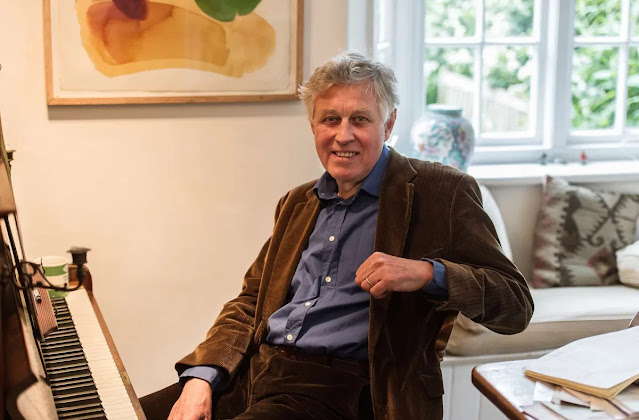
David Matthews, who turned eighty in March 2023
His technique, though not necessarily his actual voice, one tangibly less Modernist than that of his brother Colin, owes something to both. Indeed he has written, 'Schoenberg's non-vernacular language I believe to have been a sidetrack in musical history' (although he is not wholly averse to Sprechstimme). He knows his Tippett (on whom he has written an invaluable book). Most amusingly, in his multicolour attire, orange tinge, soft shoes and shambling gait, at the curtain calls he actually looked like Tippett: 'I agree with Tippett that our living vernacular is jazz, blues and above all, rock'; his own vernacular above-all would doubtless be vivid, sometimes thrilling East European (especially Czech and Slovak, but Hungarian and Romanian too) folk-music, and possibly Jewish Klezmer - each evident, not just in passing, in this pioneering opera score; and surely Bartók - a crucial trailblazer for any composer of string quartets, of which Matthews has composed, incredibly, some twenty. An extraordinary achievement, indicating his typically consistent innovation and determination.
This commitment to Eastern European culture, lifestyle and indeed politics made the late Roger Scruton's libretto, written shortly before the philosopher's death specially for Matthews, a perfect draw for him. 1989 has clearly just passed - it is not acknowledged as such - and we are in an unnamed city - surely really Communist Brno; though the advertisement for Anna clearly shows central Prague.
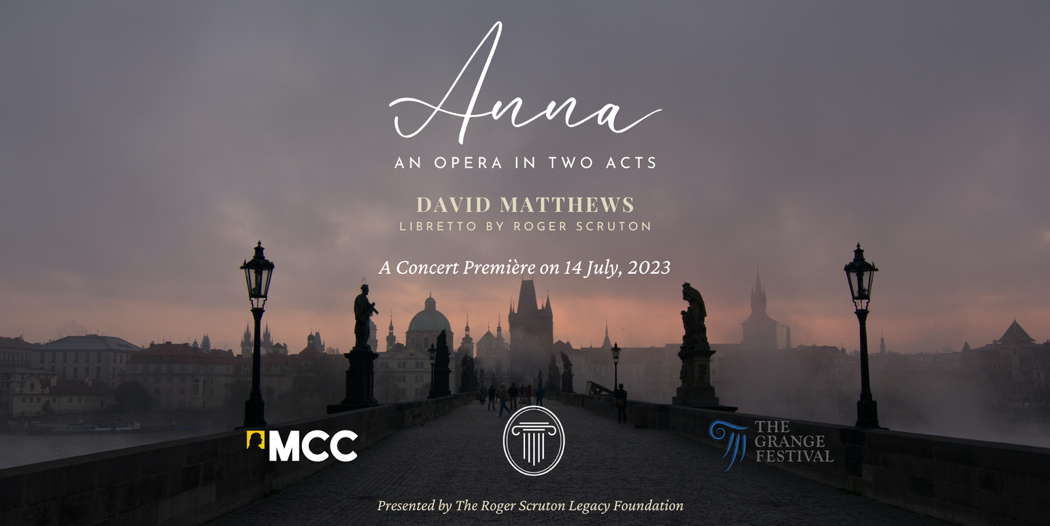
Flyer for the first performance of David Matthews' opera Anna
at Grange Park on 14 July 2023
Here a brother, Peter, Alex Otterburn, intensely moving, but explosive too, with the voice and aggressive timbre to match, and sister, Anna, Rhian Lois, sensible, feisty, and sensational at full stretch, which Matthews is not afraid to demand, both deprived in their teens of tertiary education and reduced to more menial jobs: he electrical, she a little better - librarian, due to their father's being accused, rightly or wrongly, of anti-state activity, and dying under interrogation - are coming to terms with their ill-fortune, a deep sense of grievance, and below that, even at their grown-up ages, surely a feeling of orphaning and deprivation.
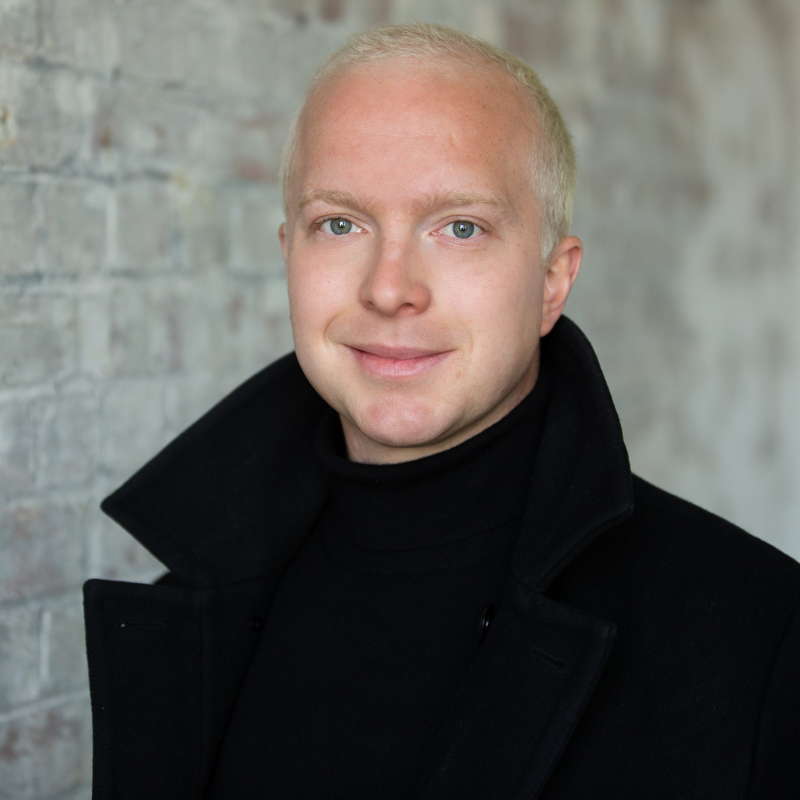
Baritone Alex Otterburn, the vexed central figure of Peter,
Anna's pessimistic brother
But they treat the present situation differently: he harbouring an urge for 'justice', to take revenge retrospectively on his father's torturers; she more positive and optimistic: 'I wish we could move on from all that happened, and begin to live'. Anna's dissidence from her brother's understandable (perhaps, in the newly freed states, quite common) obsession is much-repeated: 'You cling to the past when the future beckons': she in a reverse (fresh) way almost obsessive herself. His is an insistence - 'Forgiveness? Never!' - hers in effect a compromise, even denial. The 'freedom' she anticipates, more or less welcomes, is to him more godless than the atheist Communists themselves. 'We're all free now: everything is for sale.'
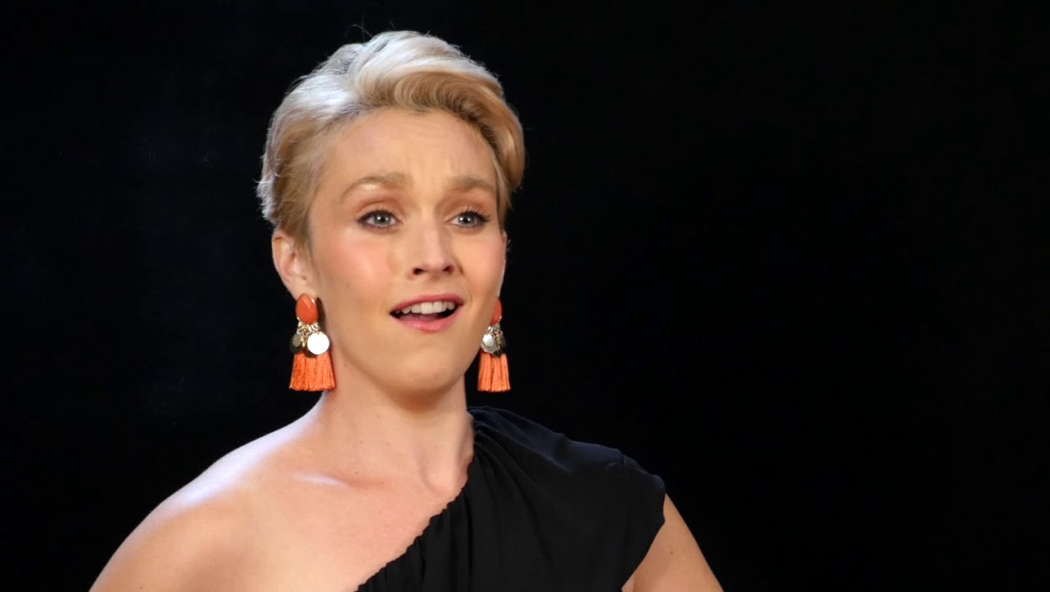
Soprano Rhian Lois, who commandingly sings the title role in Anna
'What is deserved is only half of justice: there is mercy, too', says (I think) the loyal friend, Marta. His is a fairly virulent dream of vindication and revenge; Anna's, a dream of freedom: 'We have lived through a time of darkness', she concedes - a reason for self-liberation. 'Stop it, Peter, we were romantic children then.' Then - not now. An effective verbal counterpoint, which opens the door to much in the music.
This dialogue, the pair interacted with by two other characters - a third at the end - forms the basis for the opera. Scruton's text is not surprisingly permeated by a philosophical and moral exploration or underlay, which is something Matthews is able, time and again, to bring out in his music. At certain stages during Act I, one felt the author's script slipped attractively into the poetic, rich in imagery; at others, however, mainly later on, some of that delicacy seemed to yield to a more prosaic, dialectical approach which left a great deal for composer and indeed singers to engage with. It lugubriously rabbits on, one might suggest. Too repetitive.

Roger Scruton, himself the composer of an opera,
whose libretto was set by David Matthews as Anna
If anything lingers in the mind after this memorable first performance, it is the orchestra. And this means the conductor. Jac van Steen is surely one of the most powerful, authoritative, deeply researched and skilled maestros today. One thinks of Carlos Kleiber. His ability to nurse and steer his players of the Bournemouth Symphony Orchestra was visible: his transitioning from almost a total hush to a dazzling scherzo was nothing less than electrifying; in his unique, astonishing way, he motivated them. Here was evidence of Matthews' score's range. At relevant moments van Steen rose to his full, towering height; at others he could crouch down like a kitten, almost hiding behind the lectern. He would moderate the length of his baton, to achieve a different effect. If he could generate, more obviously, a fortissimo - way beyond the size of his still ample ensemble - he could take the strings down to not just pianissimo, but quadruple piano. It was a lesson. We were watching a master at work.
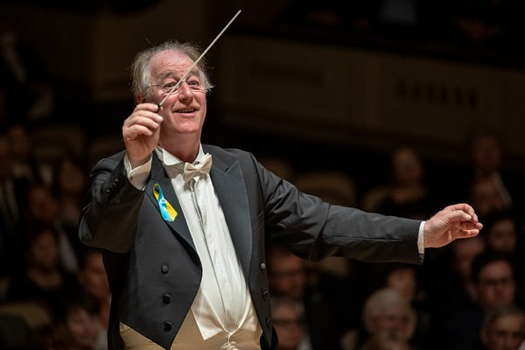
The great Dutch conductor Jac van Steen, who has recorded several of David Matthews' symphonies, was Musical Director of the BBC National Orchestra of Wales, and acclaimed for his galvanising appearances at Garsington Opera
Not just the orchestral, but every cue his soloists needed he gave, immaculately, swivelling to them, just as he arched over to the players at the rear. Time to acknowledge the two other main characters: Marta Fontanals-Simmons providing the heartening, understanding (as it happens) Marta, and tenor Oliver Johnston quite superb as the much-resented, undesirable returnee, Miro(slav).
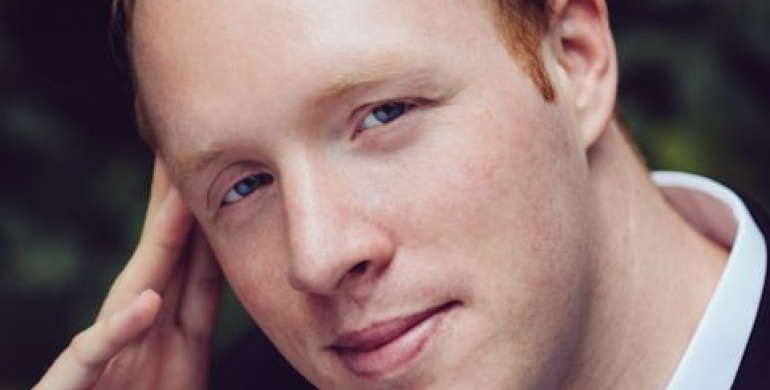
Tenor Oliver Johnston brings superb tone and musicianship to the interloper, Miro
(Peter: 'What is he doing in his home town?' ... 'I hold you to blame for my father's death; and the greed and corruption that are destroying our country.') Both these two soloists were searing, but also alleviating, and Matthews' writing for them appropriately so.
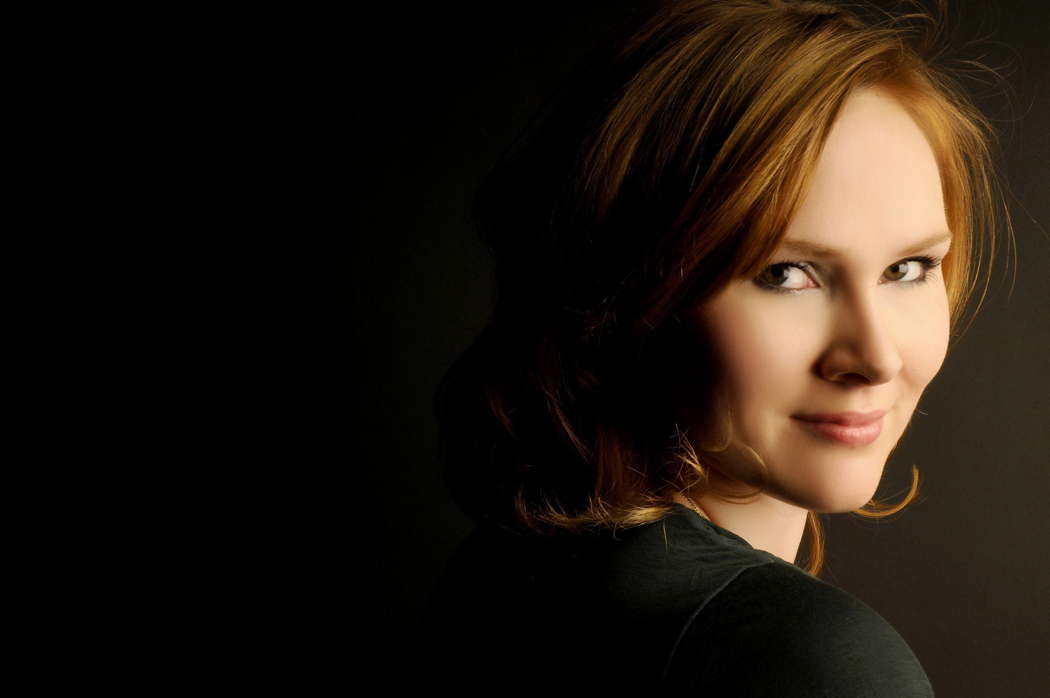
Highly praised mezzo-soprano Marta Fontanals-Simmons,
who sings the role of Marta
The vocal ensembles - duets, and an exciting, telling trio, for instance - were superbly managed. When Father Antonín - the ever-powerful, here tender bass-baritone Jonathan Lemalu - arrives as a (hopefully) steadying influence, his contribution is small but his vocal presence magnificent. (NB: Antonín is a Czech name.)
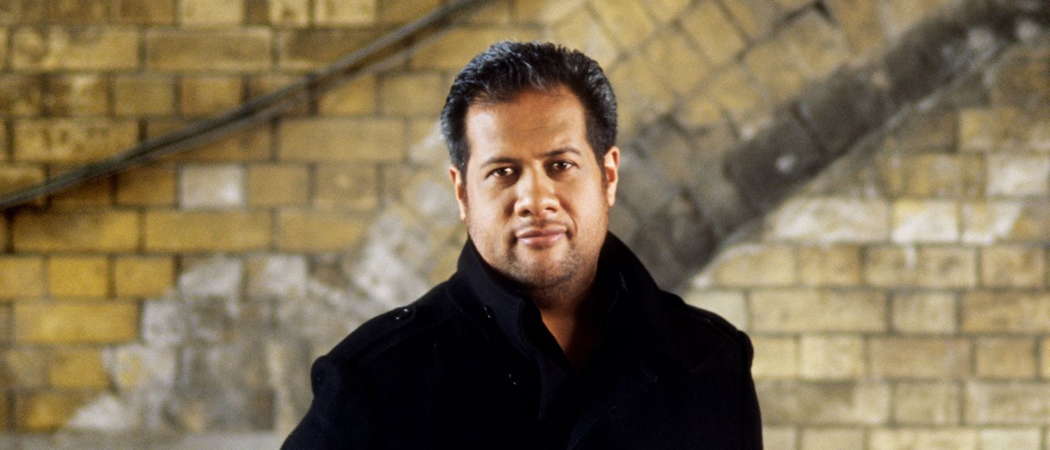
Bass-baritone Jonathan Lemalu gives presence and weight
to the role of Father Antonín
But it is still the orchestration that utterly dazzled and inspired. 'My music for Anna is symphonic', Matthews has said. Well, a real symphony - albeit in multi-movements - we were treated to. The instrumentation is sensational, indeed by its constant variety explored the imagery the libretto never quite managed to. Frequently, it made us shiver with its nervy activity, fretful in solos - insistent clarinet, whining trumpet, and the rest. The strings - violins over double bass, scratchy, pretty nasty. Cellos, surely divisi, in more than one salient moment, and together in some gripping pizzicato. The woodwind was used to miraculous effect: packed together, assuming a chromatic tinge; flute soloist plucked out from the textures to glitter, or grieve. A brass interlude - there were several, Debussy-like - breathing fire; a well-turned, unexpected sad fugue; or everyone breaking out in a kind of Klezmer dance with all the associations that might carry. The use of tympani and percussion was consistently clever, marvellously judged, and mesmerising. A small chorus, pianissimo, added a welcome layer.
And here and there, one heard not Janáček's unmistakable, jabbing voice, but maybe aspects of his technique. Matthews has allotted, he says, its own Leitmotif to each character, but surely he goes beyond that. Perhaps several, more likely; plus virtual Leitmotifs for the orchestral units, deftly and sometimes insinuatingly passed around by them. It was all very appetizing, at times intense, absorbing, and strangely thrilling. Matthews has composed (nearly) ten symphonies, nine of them already recorded on NMC, Nimbus, Dutton and Chandos, in addition to several recorded concertos - one, double.
He has surely exported his mastery of the string quartet (all adopted by Toccata Classics) into this score, hence the marvellous ranging use of orchestral sections in intimate exchange, fiery aggression, perky interplay or tumbling counterpoint. But possibly one is rightly reminded of the vivid colours - are they watercolours or acrylics? - with which he clothes his quite frequent Symphonic Poems: In the Dark Time, The Music of Dawn, Towards Sunrise, or A Vision of the Sea (his latest): there, not least, one discovers what a sensationally expressive orchestrator he is, all of it reflected here.
Matthews' (and Scruton's) Anna - supported by the Matthias Corvinus Collegium, named after the great renaissance king of Hungary, 1458-90 - is a formidable creation. Its writing was spread over three years. If one had to look for composers with whom his idiom might be paired, or with whom he has (to a degree coincidental) kinship, they would not be from our half of the twentieth century (although Tippett is arguably his most important springboard, and John Joubert comes close; Nicholas Maw offered a keen sense of encouragement), but from the primarily tonal works of the early twentieth century, composers with whom, I admit, I myself am obsessed: Schreker - one besotting passage is a dead ringer for his 1924 opera Irrelohe - Korngold and Krenek, while in more lyrical spots, as gorgeous as Samuel Barber. Diatonicism runs through his symphonies, and if anything has become more marked in his writing. Matthews has made it a mission to renew and revitalise interest in tonality, or rather tonality itself. Time and again, he succeeds.
This semi-staged (really non-staged) premiere, with a full audience, came about from a chance, and happy, meeting with The Grange's Artistic Director, the superlative countertenor Michael Chance. Would it be sensible to consider staging it, in a summer season or two? Quite possibly worthwhile. Welsh National Opera throve on mounting (from Bregenz) David Pountney's bold undertaking, André Tchaikovsky's The Merchant of Venice. It triumphed.
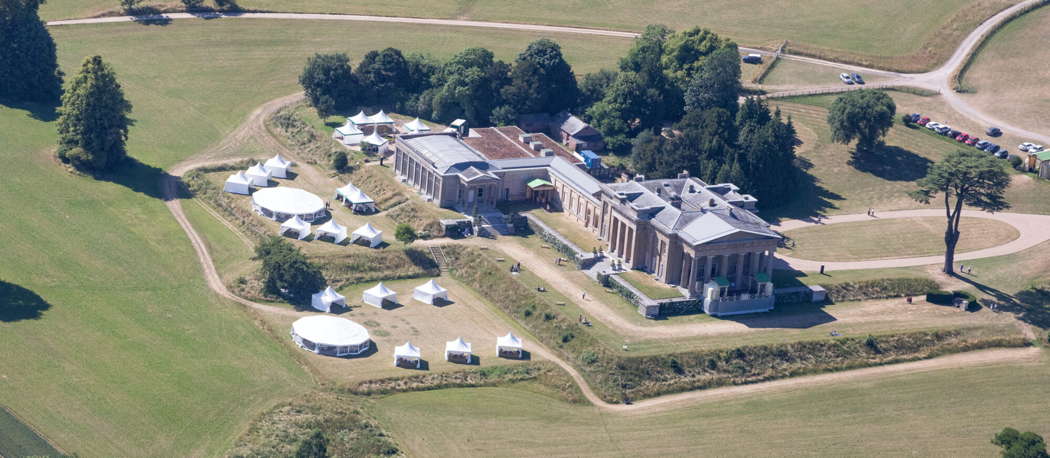
The Grange, Northington, near Winchester, UK, seen from above
Anna will gain enormously from an intelligent staging, its four chief characters interlocked in their contrasting worlds, in this respect, rather like an intimate Janáček opera based on those Ibsen-like texts by female Czech playwrights, or indeed one by his Bohemian-Moravian contemporaries Foerster and Novák. It's worth giving it a go.
Copyright © 24 August 2023
Roderic Dunnett,
Coventry UK



